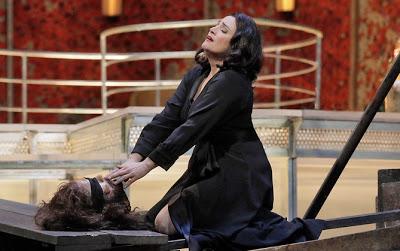
A head in the opera business: Patricia Racette (center) with the (severed) head of
Željko Lučić as Salome comes to its climax. Photo by Ken Howard © 2016 The Metropolitan Opera.
At first, Ms. Racette seemed ill at ease on the garish lucite-and-mosaic set of Jurgen Flümm's 2004 production. Picked out in bright blues and oranges, with a cardboard desert on stage left, this set looks like the kind of Las Vegas lounge environment that the company's current Rigoletto only aspires to match in tackiness. Ms. Racette was girlish and seductive in her opening duet with Mr. Wang, who made a strong debut in the tenor role of Narraboth. She began to veer from the written pitch in her long interrogation of the prophet Jokaanan, who spends most of the opera confined in a cistern downstage. As the prophet, Željko Lučić was all over the place, pulling sharp and flat in big moments and sometimes taking Ms. Racette with him. For her part, she sang with a wide, spreading vibrato that threatened to degenerate into a wobble, but pulled it together, using the vocal peccadilloes to help instigate her character's neediness and instability.
Ms Racette's singing improved once Mr. Lučić was safely back in his cistern. She produced a silvery, molten sound in her long duet with Herod, the ruler of Judea and her depraved stepfather. As portrayed by tenor Gerhard Siegel, this Herod was a study in neurosis. One wasn't sure if he were most afraid of Salome, of Herodias (played by mezzo Nancy Fabiola Herrera with appropriate detachment) or of Iokanaan's voice as it boomed out of the cistern. Thankfully, it was at this point that Ms. Racette’s voice sweetened and settled in for the long middle stretch of this one-act opera. She found deep fissures of coy flirtation, veiled, girlish threats and best of all, that unwholesome quality of raw, near-incestuous sex that is central to this opera's success. The audience sat, riveted like Herod herself, unwilling and unable to turn away.
Even as Jokaanan languished in his cistern, German conductor Johannes Debus labored in the pit. This was the house debut for the Canadian Opera Company's music director. He chose an approach of slow tempos and maximum clarity, techniques which supported Ms. Racette's performance. There was an emphasis on chamber-music qualities of this amazing score, giving the lightness of texture that Strauss wanted and so rarely got. The orchestra was kept in strict check until the Dance of the Seven Veils. Here, Ms. Racette brought some fresh ideas: an androgyne top hat, a good deal of vaguely sadomasochistic choreography with two strapping, tuxedoed dancers and at its height, the diva's best impression of Madonna as she had the boys peel off her fishnets (Herod ran off with her shoe), shimmied out of her bustier and finally treated the audience to a good, long flash.
Back to the singing. Ms Racette climbed atop the cistern's scaffolding for the intense passage that led up to the removal of Jokanaan's head by a strapping, sword-wielding executioner. This is the most intense and horrific passage in the opera, featuring a nasty bit of orchestration. Strauss has the bassists pinch up on the neck of their instrument and strike their strings sharply with the bow, producing sharp little chords that sound strikingly like a spinal cord being severed. Mr. Debus let the hounds loose in the sickening, shifting chord that accompanied the appearance of the severed head, although the full horror of that famous moment was diminished by having the foam rubber prop arrive by chain-lift elevator.
For the final apotheosis to the head, Ms. Racette found a bright voice and slightly grainy tone that swelled above the surging orchestra. And yet, her acting was as riveting as her singing, signalling her character's fall over the edge into depravity and madness as she cooed and crooned to a foam rubber replica of Mr. Lučić's head. As Salome went down that last road of no return, this characterization emerged both as a magnificent exercise in perversity and as a peculiar feminist statement. Given her upbringing in Herod's court, Salome could be no other than what she was: the princess whose every wish was fulfilled at a terrible mortal cost. When the final chords sounded and the executioner advanced, sword held high, there was almost a sense of palpable relief. The monster would be slain at last.

